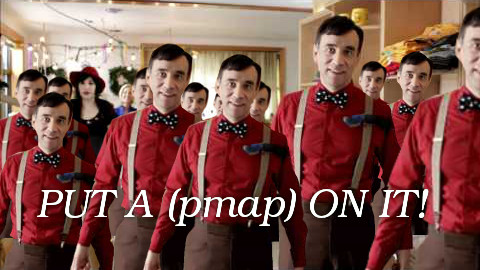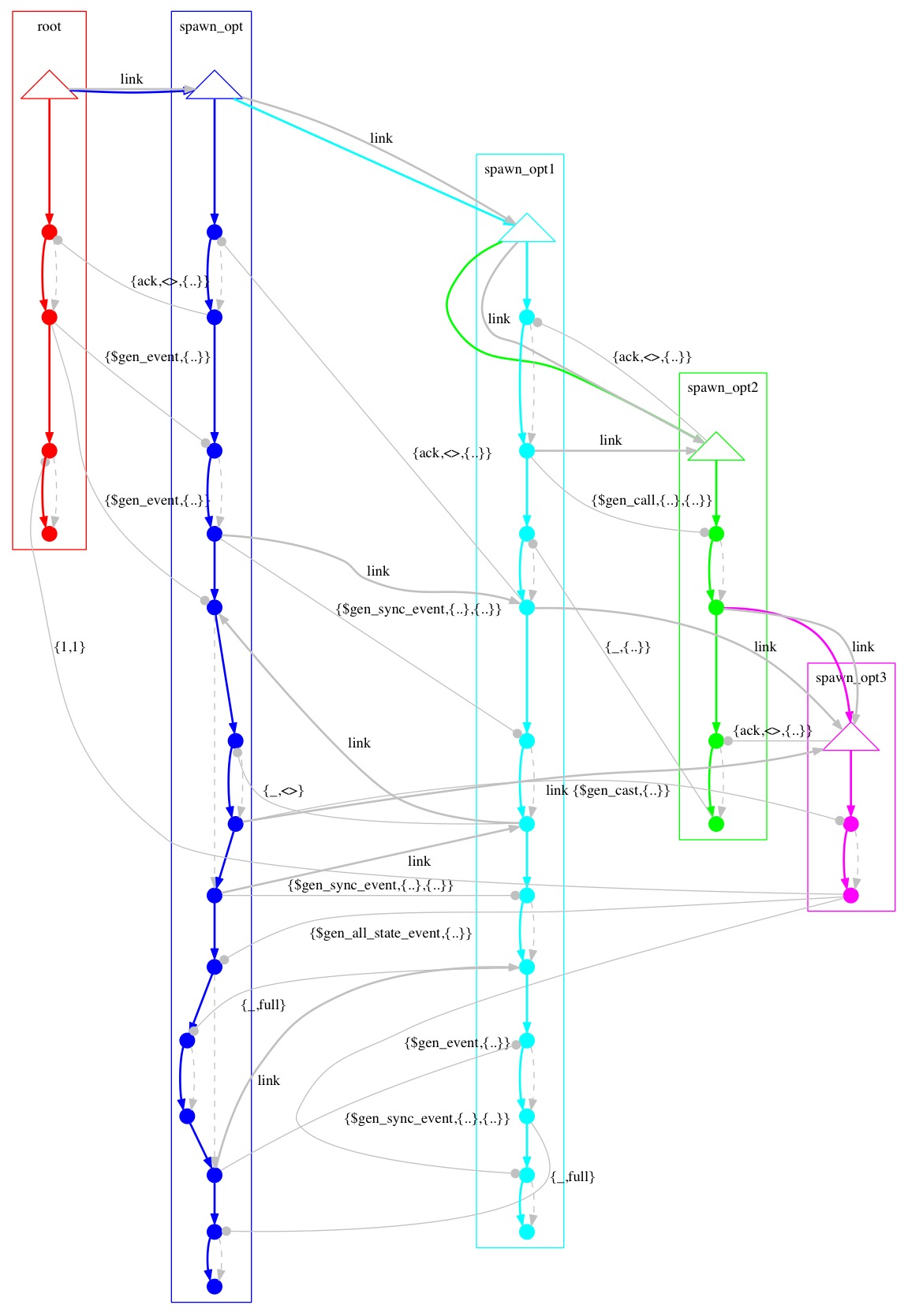test.check
Philip Potter
@philandstuff
Prelude
Generative testing with clojure.test.check
"Don't write tests, generate them!"
example: sorting
(deftest my-sort-is-correct (are [x y] (= x y) (my-sort [1]) [1] (my-sort [1 2]) [1 2] (my-sort [2 1]) [1 2] (my-sort [:foo :bar]) [:bar :foo] (my-sort [1 4 5 3 2]) [1 2 3 4 5]))
is this enough?
(defn my-sort [coll] (seq (into (sorted-set) coll)))
what do we mean by sorting?
The output is in ascending order
The output is a permutation of the input
These can be expressed as properties, independent of the particular test data
defining properties
(defspec my-sort-output-increasing-prop 100 (for-all [input (gen/vector gen/int)] (let [output (my-sort input)] (or (empty? output) (apply <= output)))))
(defspec my-sort-output-permutation-of-input 100 (for-all [input (gen/vector gen/int)] (let [output (my-sort input)] (= (frequencies input) (frequencies output)))))
running sorted property:
Testing test-check-playground.core-test
{:test-var my-sort-output-increasing-prop, :result true, :num-tests 100,
:seed 1402865690454}
Ran 1 tests containing 1 assertions.
0 failures, 0 errors.
running permutation property:
Testing test-check-playground.core-test
{:test-var my-sort-output-permutation-of-input, :result false,
:seed 1403453860357, :failing-size 9, :num-tests 10,
:fail [[3 -2 -4 -2 6]],
:shrunk {:total-nodes-visited 12, :depth 3, :result false,
:smallest [[-2 -2]]}}
FAIL in (my-sort-output-permutation-of-input) (clojure_test.clj:18)
a failure!
(my-sort [3 -2 -4 -2 6]) failed the permutation property
shrinking our failing case
[3 -2 -4 -2 6]
[3 -2 -4 -2]
[3 -2 -4]
[3 -2 -2]
[3 -2]
[-2 -2]
[-2]
[-2 -2] is a minimal failing test case
Shrinking is depth-first search without backtracking
So why did it fail?
(defn my-sort [coll] (seq (into (sorted-set) coll))) (my-sort [-2 -2]) ;=> (-2)
Compare:
(my-sort [-9 -20 -49 -20 39 -22 -40 -46 -5 30 41 44 -23 27 37 -37 -45 26 -5 -40 41 32 26 -1 41 50 -1 -29 -24 47 -33 -30 8 37]) ;=> (-49 -46 -45 -40 -37 -33 -30 -29 -24 -23 -22 -20 -9 -5 -1 8 26 27 30 32 37 39 41 44 47 50)
example: encode/decode
(defn encode-state [st] (-> st json/write-str .getBytes b64/encode String.)) (defn decode-state [st] (-> st .getBytes b64/decode String. (json/read-str :key-fn keyword)))
attempt #1
(for-all [state gen/any]
(= state (decode-state (encode-state state))))
;=> java.lang.Exception: ; Don't know how to write JSON of class java.lang.Character
attempt #2
(for-all [state (gen/map gen/keyword gen/string)] (= state (decode-state (encode-state state))))
; Ran 100 tests. 0 failures, 0 errors.
attempt #3
(def gen-json-data (gen/map gen/keyword (gen/one-of [gen/string gen/int gen/boolean]))) (for-all [state gen-json-data] (= state (decode-state (encode-state state))))
; Ran 100 tests. 0 failures, 0 errors.
Using Schema to generate data
example from https://gist.github.com/davegolland/3bc4277fe109e7b11770
;; === SCHEMA === { :x Int, (optional-key "hi") java.lang.Boolean, Keyword java.lang.Boolean} ;; == Samples == ({:x 0} {:x 1, :FP false} {:x -2, :8j true, :5J false, "hi" true} {:x -2} {:x -3, :npv false, :937 true, :GtNL false} {:x 1, :RD1P false, :1yjJ7 false, :MvJJB false, "hi" true} {:x -5, :G0z6Q5 false, :Y9XT true, :YJ false, "hi" true} {:x 4, "hi" false} {:x -5, :3tTmb3H false, :Ms59j false, :7g5 true, :pGu69 true, :1J false, :GF27V16 false, "hi" false} {:x 1, :IK true, :V87X4F3mY false, :uX false, :mqOcoU false, :559khUj5 false, :UXE2 false, :Wu9b95x2 false})
ztellman/collection-check
(assert-set-like 1e5 my-empty-set gen/int)
java.lang.Exception: Assert failed: (= a b)
a = #{0 9 -10}
b = #{0 9 -10}
actions = (-> coll transient (conj! -10) persistent!
transient (conj! 9) persistent!
transient (disj! -10) persistent!
(conj -10))
ztellman/collection-check
(assert-set-like 1e5 my-empty-set gen/int)
;; abridged for slides (defn assert-set-like [n empty-coll element-generator] (quick-check n (for-all [actions (gen-set-actions element-generator)] (let [[a b] (build-collections empty-coll #{} actions)] (assert-equivalent-sets a b)))))
ztellman/collection-check
(assert-set-like 1e5 my-empty-set gen/int)
([:conj 5] [:transient] [:disj! 5] [:persistent!])
(-> #{}
(conj 5)
transient
(disj! 5)
persistent!)
(-> my-empty-set
(conj 5)
transient
(disj! 5)
persistent!)
History
(incomplete) history of generative testing
1999: John Hughes & Koen Claessen create QuickCheck
1999-2000: Andy Gill invents shrinking
2006: QuviQ founded, creates Erlang QuickCheck
2009: PULSE presented at ICFP
2013: PULSE used to find race condition in Riak (https://github.com/basho/riak_core/issues/298)
Finding race conditions
example: thread-safe queue
(defn create-queue [] (atom PersistentQueue/EMPTY)) (defn add [q item] (swap! q conj item) nil) (defn remove [q] (let [[item rest] ((juxt first pop) @q)] (reset! q rest) item))
test data and recorded history
([:add 'ham] [:add 'egg] [:remove] [:add 'chips] [:remove])
([:add 'ham] [:add 'egg] [:remove 'ham] [:add 'chips] [:remove 'egg])
aphyr/knossos to the rescue!






knossos model
(defrecord QueueModel [items] Model (step [r {:keys [f value]}] (condp = f :add (QueueModel. (conj items value)) :remove (let [acquired-item value] (if-not (= acquired-item (first items)) (inconsistent (str "Tried to take " acquired-item " from queue offering " (first items))) (QueueModel. (pop items)))))))
sequential test
(defspec queue0-should-fit-model-sequentially (for-all [ops (gen/not-empty (gen/vector gen-queue-action))] (:valid? (knossos.core/analysis empty-queue-model (sequential-history (q0/create-queue) actions ops)))))
; Ran 100 tests. 0 failures, 0 errors.
testing in parallel
(([:add 'a1] [:add 'a2] [:remove]) ([:add 'b1] [:remove] [:add 'b2]))
(([:add 'a1] [:add 'a2] [:remove 'b1]) ([:add 'b1] [:remove 'a1] [:add 'b2]))
(([:add 'a1] [:add 'a2] [:remove 'a1]) ([:add 'b1] [:remove 'a2] [:add 'b2]))
coping with nondeterminism
(defn always [n prop] (gen/fmap #(or (first (remove :result (drop-last %))) (last %)) (apply gen/tuple (repeat n prop))))
(always prop) repeatedly tests the given property n times
parallel test
(defspec queue0-should-have-linearizable-parallel-behaviour (always 40 (for-all [t1 (gen/not-empty (gen/vector gen-queue-action)) t2 (gen/not-empty (gen/vector gen-queue-action))] (:valid? (knossos.core/analysis empty-queue-model (recorded-parallel-history (q0/create-queue) actions {:t1 t1 :t2 t2}))))))
{:test-var queue0-should-have-linearizable-parallel-behaviour,
:result false,
:seed 1403643157336,
:failing-size 0,
:num-tests 1,
:fail [[[:remove] [:remove]]
[[:add 2] [:add -1]]],
:shrunk {:total-nodes-visited 108, :depth 66, :result false,
:smallest [[[:add 0] [:remove]]
[[:remove]]]}}
attempt two
;; old and busted: (defn remove [q] (let [[item rest] ((juxt first pop) @q)] (reset! q rest) item)) ;; new hotness: (defn remove [q] (let [item (first @q)] (swap! q pop) item))
results
{:test-var queue1-should-have-linearizable-parallel-behaviour,
:result false,
:seed 1403643165214,
:failing-size 0,
:num-tests 1,
:fail [[[:remove]]
[[:add 0] [:remove]]],
:shrunk {:total-nodes-visited 108, :depth 57, :result false,
:smallest [[[:remove]]
[[:add 0] [:remove]]]}}
attempt three
(defn remove [q] (loop [] (let [oldval @q] (if (compare-and-set! q oldval (pop oldval)) (first oldval) (recur))))) ;; can also use trade! from flatland/useful ;; (but don't look at the implementation!)
; Ran 100 tests. 0 failures, 0 errors.
attempt four
(ns philandstuff.test-check-knossos.java-queue (:import [java.util.concurrent ConcurrentLinkedQueue] [java.util Queue]) (:refer-clojure :exclude [remove])) (defn create-queue [] (ConcurrentLinkedQueue.)) (defn add [^Queue q item] (.add q item)) (defn remove [^Queue q] (.poll q))
; Ran 100 tests. 0 failures, 0 errors.
future: user scheduler
Finding Race Conditions in Erlang with QuickCheck and PULSE, Claessen et al, ICFP 2009
Hoping to trigger races is a hack
PULSE generates random but deterministic schedules for erlang programs
Can re-run failing schedule later to see if you have fixed the race
Race condition found in Riak:

the problem: shared-memory concurrency
PULSE is at a massive advantage: only have to instrument sending & receiving messages
In clojure, you'd have to instrument: atoms, refs, agents, promises,
:volatile-mutable sets, almost all java interop…
links
philandstuff/test-check-knossos
Finding Race Conditions in Erlang with QuickCheck and PULSE, Claessen et al, ICFP 2009
John Hughes (QuickCheck) and Reid Draper (clojure.test.check) at clojure/west
unsorted stuff
(this section wasn't presented, it's just scraps of material that didn't make it into the talk)
shrinking in more detail
shrinking is type-specific
integers shrink to 0
vectors shrink by removing elements
and also recursively shrink their contents
shrinking is a tree, not a list
if [1 2 3] fails, could try any of these next:
[1 2] [1 3] [2 3]
[1 2 2] [1 1 3] [0 2 3]
proceed by depth-first search, no backtracking
the menagerie of generators
primitives
boolean int nat pos-int ratio keyword
(choose 0 63) (elements [:foo :bar :baz]) (return :any-val)
compound data
(tuple int boolean)
(vector nat)
(list (map keyword any-printable))
any any-printable
not-empty
combining generators
one-of frequency such-that bind fmap
tweak shrinking behaviour
no-shrink shrink-2
notes from riak community hangout
https://www.youtube.com/watch?v=D06M8NMJYCw downsides:
- slower to write tests
why doesn't [-2 -2] shrink to [0 0]?
- and the shrink-2 combinator